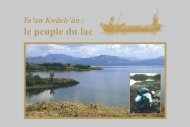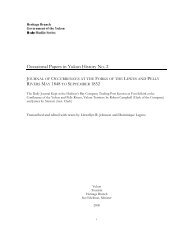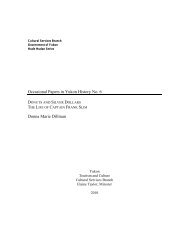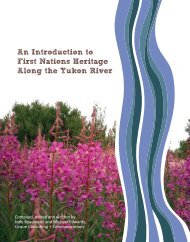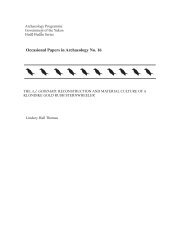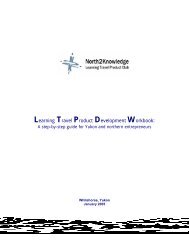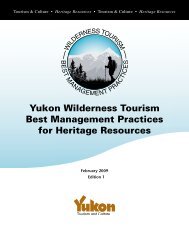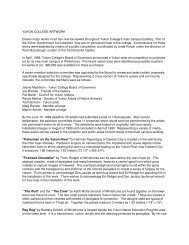Sustainable Tourism: The Tour Operators' Contribution
Sustainable Tourism: The Tour Operators' Contribution
Sustainable Tourism: The Tour Operators' Contribution
Create successful ePaper yourself
Turn your PDF publications into a flip-book with our unique Google optimized e-Paper software.
• Before the visit, through literature and web sites, and a comprehensive trip dossier explaining the visited<br />
region, the host partner’s role, the project, local language and culture and the clients’ code of conduct;<br />
• During the visit, through tour leaders, recognised wildlife experts, researchers and local experts who add<br />
local insight and knowledge; and<br />
• After the visit, by becoming members of the host conservation organisations, and through a newsletter<br />
and the web site, lectures, talks and presentations and feedback requests.<br />
Funds are transferred to the projects on a per participant<br />
or lump sum basis to cover project costs. Typical funds<br />
range from US$150 to 500 per participant or a lump sum of US$3,000 to 15,000. Other sources of income<br />
(such as from sponsoring organisations) are available to specific projects in addition to the participation<br />
fees. Discovery Initiatives also provides matching funds for specific projects and in-kind support. Initially,<br />
Discovery Initiatives did not monitor its payments to wildlife agencies, trusting in their own trustees and<br />
knowledge of how best to spend the funds. However, this policy is now being reviewed, with the goal of<br />
having greater influence on directly supported projects.<br />
Since 1997, Discovery Initiatives has collaborated and partnered with 37 NGOs, including WWF UK,<br />
Rainforest Concern UK, Integrated Rural Development of Nature and Conservation (Namibia), Rivers<br />
Canada, Mongolian Association for Conservation of Nature, Big Game Parks (Swaziland), Chobe Wildlife<br />
Society (South Africa), Pacific Whale Foundation (Hawaii), Conservation International (USA), the Jane<br />
Goodall Institute (USA) and Orang-utan Foundation UK.<br />
Benefits<br />
Discovery Initiatives’ tours have resulted in a number of benefits for conservation, local communities, the<br />
company and clients.<br />
In the last four years, Discovery Initiatives’ tours have contributed US$300,000 to conservation initiatives and<br />
agencies around the world, an amount equal to 6 percent per annum of company revenue.<br />
Benefits to local communities go beyond the direct financial contributions generated from the project.<br />
Communities also benefit from a greater sense of ownership and pride in their environment, as the tours<br />
demonstrate that the local environment can be an important economic resource.<br />
<strong>The</strong> holiday programmes have also greatly benefited Discovery Initiatives’ business, which grew more than<br />
25 percent in 2002.<br />
Finally, Discovery Initiatives’ clients benefit from these holidays through enhanced cultural understanding, a<br />
fresh perspective and greater environmental awareness and stewardship. Customer feedback on these trips<br />
is overwhelmingly positive, and the company has high levels of repeat business.<br />
<strong>Sustainable</strong> <strong><strong>Tour</strong>ism</strong>: <strong>The</strong> <strong>Tour</strong> Operators’ <strong>Contribution</strong><br />
killer whales iN the suN<br />
4. Product Management and Development




